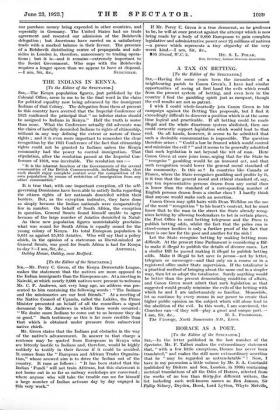A TAX ON BETTING.
• [To the Editor of the SPECTATOR.]
SIR,—Having for some years been the incumbent of a neighbouring parish to Canon Green's, I have had similar opportunities of seeing at first hand the evils which result from the present system of betting, and even here in the country I find the gambling spirit just as rampant, though the evil results are not so patent.
I wish I could whole-heartedly join Canon Green in his campaign against the Betting Tax proposals, but I find it exceedingly difficult to discover a position which is at the same time logical and practicable. If all betting could be made illegal and the whole disastrous system abolished, then one could earnestly support legislation which would lead to that end. On all hands, however, it seems to be admitted that such a desirable consummation is impossible. The question therefore arises : " Could a law be framed which would control and minimize the evil ? " and it seems to be generally admitted that such legislation is not beyond the wit of man. Here Canon Green at once joins issue, urging that for the State to " recognize " gambling would be an immoral act, and that such recognition would lower the general moral standard of the community. Is this so ? In countries like Canada or France, where the State recognizes gambling and profits by it, is it true that the general moral and ethical standard of, say, any ten representative persons drawn from any social class is lower than the standard of a corresponding number of English persons drawn from a similar class ? I hardly think that anyone would make such an assertion.
Canon Green may split hairs with Dean Welldon on the use of the word " recognition " to his heart's content, but he must know that to the man in the street the State already recog- nizes betting by allowing bookmakers to bet in certain places, the Post Office to send betting telegrams and the Press to publish betting odds, whilst the fact that the police run in street-corner bookies is only a further proof of the fact that there is one law for the poor and another for the rich I Let the State recognize betting by making betting more difficult. At the present time Parliament is considering a Bill to make it illegal to publish the details of divorce cases. Lel a similar Bill be passed making it illegal to publish betting odds. Make it illegal to bet save in person—not by letter, telegram or messenger—and that only on a course or in a registered office under State supervision. If the totalisator is a practical method of bringing about the same end in a simpler way, then let us adopt the totalisator. Surely anything would be better than the present demoralizing condition of affairs, and Canon Green must admit that such legislation as that suggested would greatly minimize the evils of the betting with which he and I are unfortunately so familiar. Meanwhile, let us continue by every means in our power to create that higher public opinion on the subject which will alone lead to the abolition of the evil. In this work, I am convinced, the Churches can—if they will play a great and unique part.—










































 Previous page
Previous page